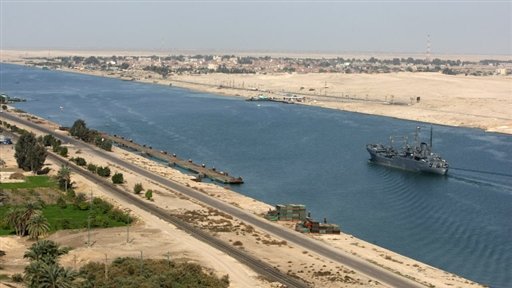
(AFP Photo)
In an interview with Logistic, Youssef stated that the new transactions, expected to proceed during 2013, will go toward the company purchasing a new ferry to carry passengers.
Youssef pointed out that the company arranges an average of 270 trips per year, in comparison with 243 trips in previous years.
He continued to say that the company aims to operate as many ferryboats as possible, especially since the company’s new administration oversees the maintenance and operation procedures of the main ferryboats of Egypt and Saudi Arabia, both of which are state-controlled.
Youssef added that 95% of passengers of the FMTC are Egyptians travelling back and forth between the Safaga and Hurghada ports.
Youssef said the company has also strengthened regulations and procedures aimed at ensuring passenger safety.
On the subject of maintenance, he highlighted the company’s full capacity of conducting overall maintenance to ferryboats through organised workshops inside the Safaga port.
He further stated that the company’s ferryboats only operate after passing maintenance inspections, and the company owns modern storage rooms to be used for technical insurance and critical maintenance emergencies.
Youssef said that the company is fully capable of owning, renting and administrating all operations and running maintenance on all ferryboats and port units, in addition to conducting development plans and locating missing [sunken] ships.
The company also offers its full services to foreign ships to include maintenance and preservations inside Egyptian ports.
He confirmed that the accident reports reveal that 85% of accidents are caused by human error, which represents the biggest concern for the company, followed by the failure of equipment on the ships.
The two boats of Egypt and Saudi Arabia have been upgraded with the latest communications technology such as night vision and Long-Range Identification and Tracking (LRIT) devices.
Electronic mapping systems have also been installed, along with appropriate fuel quality that is suitable for use in the region. Technical adjustments were also set on both ships of Egypt and Saudi Arabia to meet the required standards set by the Egyptian authorities.
Youssef said that the current events in the country, and in the past two years, have negatively affected the number of passengers, due to employees directly being affected by any sudden changes.
Another reason for the low number of passengers is because a portion of the Egyptian labour force in Saudi Arabia prefers to stay there during their holidays from work, so that they don’t risk losing their jobs, should they not come back.
It has been reported that 15% of the Egyptian labour force who have left to Saudi Arabia, have not come back.
This is all due to the unstable security situation in Egypt, and due to tourists flocking to Saudi Arabia, in comparison to Egypt, which has been known for bringing in 5% to 10% gulf nationals from its main ferryboat from Saudi Arabia, Youssef reported.
Among other problems that Youssef listed, the company has been affected, just like any other logistics company, by the recent Egyptian pound slump against the American dollar, and high prices of oil in international markets amid the unfair competition from foreign oil companies.
He made clear that petrol prices and expenses of the transportation industry are the main contributors to ticket pricing of ferryboats, especially that 80% of infrastructure needs are priced using the American dollar, which sets the price for a ticket per person at one Egyptian pound.
Despite the current rise in prices and the political turmoil and unstable security that affected the industry, the company managed to make the biggest market share and gained recognisable profits during 2012, Youssef said.
The main factor affecting maritime activities in Egypt is the lack of a set strategy aimed at pumping new investments into the shipping industry, amid development plans and the infrastructure of port units.



